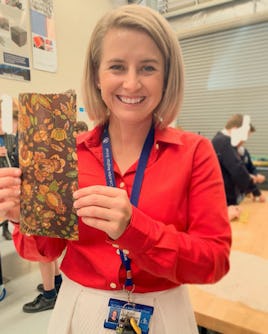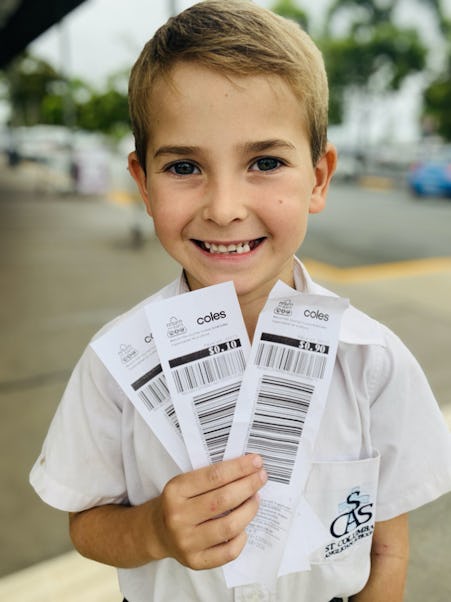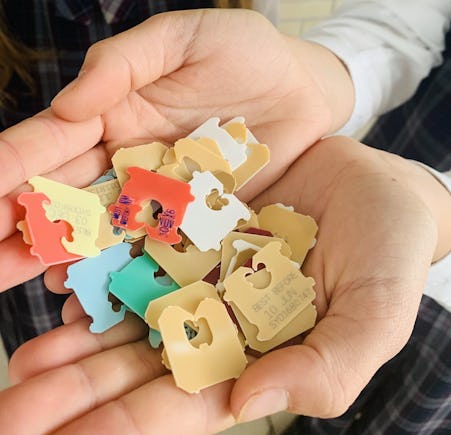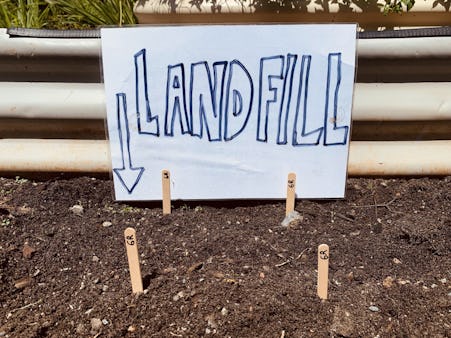This year has thrown some curveballs our way, but it has also required us to pause, think about what we want our future to look like and reset accordingly. For National Recycling Week this year we are looking ahead to our Future Beyond the Bin, where materials remain in circulation and what was once seen as waste is understood as resource. To that end, we are asking Australians from all walks of life to share their inspiring stories of how they #gobeyondthebin at work, home, school and in the community.
Last year’s Youth Climate Strike showed the world just how passionate young people are about the environmental challenges that we are facing. It should come as no surprise, then, that sustainability initiatives are taking off in schools across the country.
Port Macquarie’s St Columba Anglican College runs a number of impressive programs, from workshops on beeswax wrap making to installing ‘GOOS’ (Good on One Side) paper bins in classrooms. St Columba is also one of nine Mid North Coast schools that has signed on to participate in a new food waste reduction program called ‘Lunchbox Leftovers’. Delivered in partnership with MidWaste, the NSW Government’s ‘Love Food Hate Waste’ program and BehaviourWorks Australia, the program aims to educate kids about food waste by encouraging them to make their own lunches and take home any leftovers.
We caught up with St Columba primary teacher and head of the sustainability committee, Kylie Rosenbaum, to talk about how the school’s sustainability programs are teaching students to take responsibility for their waste.
Planet Ark: Who are you and what do you do?
Kylie Rosenbaum: I am a primary teacher at St Columba Anglican School in Port Macquarie. I lead the sustainability committee and circus in the primary school.
Why is reducing environmental impact important to St Columba Anglican School?
It is important because we have a huge moral duty to ensure that the future generation is informed of how their decisions impact this earth. As we are a large school our platform is enormous with wide reaching impact.

What sustainability initiatives have been implemented at the school?
So many! We have introduced many incentives to reduce lunchbox waste and encourage nude lunchboxes. We have collected data, done bin audits and created newsletter and social media presentations. We have run workshops on making beeswax wraps and reusable bags from t-shirts.
We have a ‘Lunchbox Leftovers’ program run by MidWaste to encourage students to be involved in the creation of their lunchboxes in order to reduce food waste. As a result of this, we received a Subpod and we’re about to begin some training on how to compost and what we should be putting into it.
Can you talk us through how you approach the four 'Rs'?
Refuse: We have refused the use of plastic bin liners in our primary classrooms and replaced them with paper liners made out of old book club catalogues.
Reduce: We are about to run a reduction in printing initiative where staff are encouraged to reduce printing numbers and colour printing. We have created e-posters to ask staff to think twice before printing. We are also hoping to have a prompt appear on the printer before you can print. We have reduced the amount of rubbish going to landfill by removing all of the red bins in the Stage 2 and 3 eating areas.
Reuse: We have GOOS (Good on One Side) paper bins in many classrooms so that paper can have a second life before being recycled. We are also reusing old t-shirts and making them into bags before donating them to our local fruit stalls. We have an online second-hand uniform platform so that our school uniforms can get the most mileage possible.
Recycle: We have paper recycling, battery recycling, stationary recycling, bread clip recycling and return and earn for drink containers.


How is your school tackling food waste through the Lunchbox Leftovers program?
Through encouraging students to get involved in the making of their lunchboxes, we are really encouraging them to share images of them in the kitchen so that we can praise them and share them with other students. We [present these in a] weekly slideshow and we have had some excellent class discussions about food waste also!
[We also have] no waste or low waste lunch boxes for Stages 2 and 3, with only green bins available[in their eating area]. This is easy to implement as the students are aware that if they have any waste it must go [back] into their lunchboxes to be addressed at home. This helps them to understand the impact of waste going into landfill and that there is no such thing as ‘away’.
How passionate are the students about environmental issues?
They are very passionate and without them our initiatives would not get off the ground. The creation of the content for our assembly items, which involves the collection of data and photographs, is a huge job. But without this fortnightly reminder that is specific to our school the students could easily think that sustainability falls off the radar.

What has been the most inspiring or memorable action a student has taken in an effort to look after the environment?
One of my previous students, Shalise Leesfield, taking on the world to save the oceans and marine life! She is amazing. Also, my students giving up countless lunch breaks to commit themselves to sustainability — lunch breaks are a big deal to kids!
What has been the most surprising lesson you've learned on your sustainability journey?
How unsustainable so many of our ways of life are. Without education we are really unaware of the consequences of our actions. Everyone can do better and education is the key.
National Recycling Week takes place from November 9-13. For more information and to find out how you can get involved, head here.